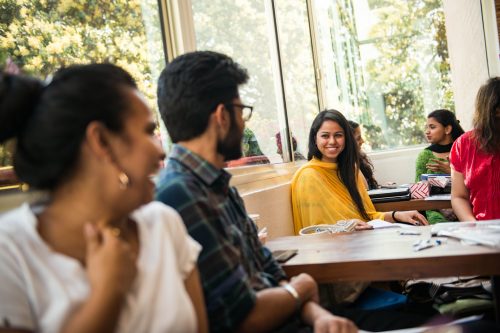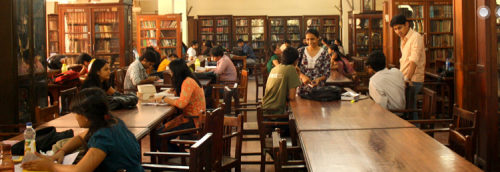While Taking Admission in a College, Make Sure You Check That It’s Not Fake. Here’s How.
Be vigilant and make sure you enroll in an institute that's perfect for you and isn't taking you for a ride.

With admission season just around the corner, lakhs of students and parents will line up outside colleges and universities in India in pursuit of higher education. But lately, there’s been apprehension about a large number of colleges cropping up across the country that were found to be offering fake degrees.
So, how do you know if the college you’re applying to is legitimate?

Image for representation. Photo source: Flickr
The University Grants Commission is your friend
For starters, the University Grants Commission website is a good place to start while researching on any university, college or institute. It is the body that was set up by the government to oversee the machinations of higher education in India, and just in time, it has also released a list of 22self-styled, unrecognised universities(and one that is still under investigation) that parents and students can refer to while applying for colleges.
A quick crash course on the landscape of higher education
In India, there are largely four types of universities that are recognised by the UGC. They are:
Central universities: They are also called Union universities. They are formed by an act of parliament. They are governed by the Central Universities Act 2009. In case of Central universities, they can award degrees but cannot grant affiliations to colleges. There are a total of 46 Central universities in India.
The list can be found here
State universities: As of 2011, there were 356 state universities in the country. They are run by the state government or Union Territories.
The list of state universities can be found here
Deemed universities: The Central government on the advice of UGC grants certain institutions the accreditation of deemed universities or deemed-to-be universities. In 1958, the Indian Institute of Science is said to have been the first university to be granted this status as a deemed university. These universities can enjoy the autonomy to set their own guidelines for admissions and fee structure. They can also design their own syllabus and course work.
The list of all deemed universities can be found here
Private universities: They are privately funded universities. The UGC has deemed that there are 264 private universities that can grant legitimate degrees.
The list of Private Universities can be found here
In addition, there are autonomous colleges that essentially work as small universities by and large and can set up their own syllabus and offer courses in accordance to global employability needs and announce their own results. A list of such institutes can be found here
And there are also institutes that may not have the title of a university but are called “autonomous bodies” and “university-level institutions.” They fall under the administrative control of Department of Higher Education. Institutes like IITs, IIMs, IIITs, NLU and others fall under this category.
How would you know if your college is any good or straight up fake?

Image for representation. Photo source: Wikimedia
Here are some basic steps you can employ if you aren’t sure about the kind of education imparted by the college you are eyeing:
Start with the institute’s website
Start with an internet search to see the kind of press coverage (if any) the college or university has gotten. And then thoroughly check the website of the college that you are interested in. If a college or an institute doesn’t have a website in the first place, then that’s a clear red flag that shouldn’t be ignored. And make sure that the college or institute has prominently displayed affiliation and accreditation in its homepage itself. If they have nothing to hide, they wouldn’t hide this. It’s that simple.
Check its grades
National Assessment and Accreditation Council is an autonomous body that is funded by the UGC to assess institutes offering higher education in the country and they also grade these institutes accordingly. The highest grade that the body confers is A. This is the kind of information that colleges ought to be able to produce to prospective students immediately.
If not, click here to check for the accreditation status of the college or university you are interested in.
Ask a lot of questions
While applying to colleges or universities, take some time out to reach out to students who are already studying there and have a quick discussion to see if the ethos of the institute aligns with yours. Have discussions with teachers and professors on how the curriculum is structured. Never feel intimidated to ask a lot of questions. After all, you may have to spend years in that institute. It might as well be a place you feel comfortable in and a place that suits your style.
You may also like: College Students in Mumbai Have Banded Together to Make Sure the City Votes in the Upcoming Election!
Hit online student boards
If in doubt, head over to any number of popular online portals that exist in India that cater exclusively to students. Most of these portals have highly active discussion boards where one can start threads soliciting opinions from fellow students. If you get the feeling that the institute that you are interested is not being entirely honest (or is stretching the truth about any number of issues including accreditation or placements), plaintively pose this query on these boards. You will most likely get the answers.
Portals like EduVidya are extremely popular with Indian students
Watch out for obvious red flags
If you know that the college you are interested in is admitting students who didn’t clear their Board exams, then that could be a problem on the kind of education that the institute is willing to compromise on. It could also be a sign that the institute is desperate to admit students and may be flouting UGC guidelines and could lose its accreditation as a result of that.
You may also like: TBI Blogs: How Faizabad’s Saket University Got Its First-Ever Female Student President
While applying to new colleges, go right to the source
In case of colleges that are brand new, it is obviously impossible to verify their quality through older students or professors. In that case, try finding out which universities such institutes are affiliated with and then directly contact those universities to verify the claims made by the institute in question.
Recently, a female student from Bengaluru found out her college (which had completed one semester) was fake, when they didn’t announce the results. They told her that the results were late because Bangalore University (the college they claimed to be affiliated with) had delayed the process. Sensing that something was amiss, she directly went to Bengaluru University to raise the issue, upon which she found out that BU wasn’t affiliated to any college under that name.
Be vigilant.
Once again the UGC is your friend
In case you have come to believe that the college or institute that you belong to is conning you, verify them by directly contacting the UGC. This is your future.
The entire list of fake universities can be perused here
UGC can be contacted here.
Like this story? Or have something to share? Write to us: [email protected], or connect with us on Facebook and Twitter.
NEW: Click here to get positive news on WhatsApp!
If you found our stories insightful, informative, or even just enjoyable, we invite you to consider making a voluntary payment to support the work we do at The Better India. Your contribution helps us continue producing quality content that educates, inspires, and drives positive change.
Choose one of the payment options below for your contribution-
By paying for the stories you value, you directly contribute to sustaining our efforts focused on making a difference in the world. Together, let’s ensure that impactful stories continue to be told and shared, enriching lives and communities alike.
Thank you for your support. Here are some frequently asked questions you might find helpful to know why you are contributing?


This story made me
-
97
-
121
-
89
-
167











